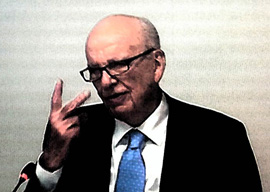
December 20, 2012

Rupert Murdoch
Leveson criticizes both David Cameron and New Labour for being too close to the media, although he found no evidence of any “deal” between Cameron and News International. Senior politicians, he avers, should declare their long-term relationships with journalists and summarize the proceedings of meetings and correspondence. The same will apply to ministers” representatives and lobbyists.
Many of these proposals will probably be dropped quietly into what Whitehall wags call “the circular filing cabinet.” But the government has yet to formulate its official response, and this may be long delayed. Downing Street may secretly enjoy having the whip hand over the press. When the Daily Telegraph contacted Culture Secretary Maria Miller’s office recently to inquire about her expenses claims, an adviser reminded the paper silkily:
Maria has obviously been having quite a lot of editors” meetings around Leveson at the moment. So I am just going to kind of flag up that connection for you to think about.
It is likely that the government will agree to a new body, but not a statutory one, which most Tories fear would be subject to political interference. The difficulty is separating political from nonpolitical and legislation from statute.
The political divide is stark, with the right generally against statutory regulation and the left generally in favor”an ironic turn of events for those who see themselves as liberal iconoclasts. The left has always had a generally low opinion of the UK print media but a correspondingly high opinion of the UK broadcast media. In all the pages of Leveson there are no critical references to the Guardian, Independent, or the BBC.
But even within conservative ranks there are Leveson lovers, although they are partly counterbalanced by non-Tory Leveson loathers. The Daily Telegraph of November 9th pointed out that some of these public-spirited ones may have personal reasons, listing embarrassments for which they had been criticized or ridiculed, ranging from expenses to a wife who augmented her husband’s salary by turning tricks at £70 a time.
The chastened print media are still trying to find ways to avoid subjecting themselves to any kind of control, with Lords Black and Hunt attempting to put together a coalition of editors for stronger self-regulation”and whatever they say in public, practical politicians will not wish to break with this group completely. What may in the end undo the print media may not be so much political opposition but cultural changes, with all print media (whether regulated or not) losing ground to uncensored Web media”a growingly important subject almost completely beyond Lord Leveson’s remit (only one page in those 2,000 is devoted to the Internet) and which is making it more outdated hourly.
The situation is accordingly fluid and fraught with difficulties of definition as well as implementation, with politicians needing the media at least as much as they hate them. Much will depend on how long the Leveson-boosters can maintain their momentum and what else may come along to distract our attentions. It could be that there will be some kind of “breakthrough,” but it is equally possible that Leveson will linger long on everyone and no one’s agenda until its air goes out at last”half-embraced, half-rejected, an enthusiasm for radicals, an embarrassment for realists.